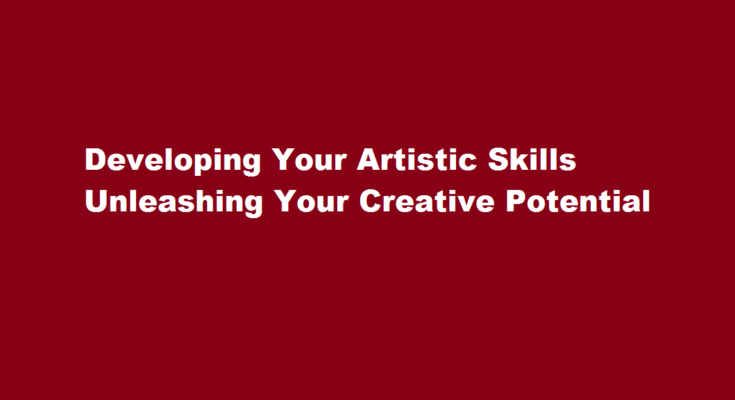Introduction
Art is a profound form of self-expression that allows individuals to convey their thoughts, emotions, and perspectives. Developing artistic skills is an ongoing journey that requires dedication, practice, and an open mind. Whether you’re a beginner or an experienced artist looking to enhance your abilities, this article will provide valuable insights and practical tips to help you embark on a fulfilling artistic development process.
Embrace Creativity and Exploration
The first step in developing your artistry is to cultivate a mindset that embraces creativity and encourages exploration. Allow yourself the freedom to experiment with different mediums, styles, and subjects. Step outside your comfort zone, explore new techniques, and challenge yourself to think beyond traditional boundaries. By embracing curiosity and embracing new ideas, you’ll discover unique ways to express yourself artistically.
Observe and Study
Developing your artistry requires a keen eye for observation and a thirst for knowledge. Take the time to study various art forms, both contemporary and historical, and analyze the work of other artists. Pay attention to details, composition, color schemes, and the emotional impact of different artworks. By studying and analyzing art, you’ll gain a deeper understanding of the principles and techniques that underpin successful creations.
Seek Inspiration
Inspiration can be found everywhere: in nature, everyday life, literature, music, or even within your own emotions. Surround yourself with art and immerse yourself in diverse cultural experiences. Attend art exhibitions, visit museums, and engage with the artistic community. Engaging with other artists and their work will inspire you to develop your unique style and explore new artistic possibilities.
Practice Regularly
Consistent practice is the cornerstone of artistic development. Set aside dedicated time each day or week to hone your skills. Practice drawing, painting, or sculpting, depending on your chosen medium. Experiment with different techniques and push your boundaries. Remember that progress takes time, so be patient and persistent. Regular practice will help you improve your technical skills, develop your artistic voice, and refine your style.
Seek Feedback and Learn from Criticism
Constructive feedback is invaluable in developing your artistic abilities. Share your work with trusted friends, mentors, or art communities. Be open to criticism and use it as an opportunity for growth. Critiques can provide valuable insights, enabling you to identify areas for improvement and gain new perspectives. However, remember that art is subjective, and not all feedback may resonate with you. Trust your instincts and use feedback to guide your artistic development rather than letting it discourage you.
Document Your Progress
Keep a sketchbook or an art journal to document your artistic journey. This not only allows you to track your progress but also serves as a source of inspiration when you’re feeling stuck. Reviewing your earlier work can reveal how far you’ve come and motivate you to continue pushing your artistic boundaries.
FREQUENTLY ASKED QUESTIONS
What are the 7 main things of art?
The 7 elements of art are: line, shape, value, color, texture, space and form.
What is art skill?
Artist skills are abilities someone learns in order to create something unique. A person with artistic skills can use a variety of tools and methods to create works of art.
Is art a natural talent?
Some people believe that you need to be born with talent in order to be a good artist, but this is not true. Anyone can learn to draw or paint with enough practice. Some of the most famous artists in history were not born with talent, but they practiced regularly and became great artists.
Conclusion
Developing your artistry is an ongoing process that requires passion, dedication, and perseverance. Embrace creativity, explore various art forms, seek inspiration, practice regularly, and be open to feedback. Remember that every artist’s journey is unique, and comparison can hinder your progress. Embrace your individuality and let your art reflect your authentic self. By following these guidelines and remaining committed to your artistic growth, you’ll unlock your creative potential and create meaningful and impactful art.
Read Also : The Art of Scoring Discounts How to Get a Discount on Any Product



